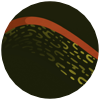The Bad Psychologizing of Neuroscience
And the Quest for Metaphor

Every theory is composed of metaphor. And conversely, every metaphor is a little theory. Beware therefore, the slipped mickey of suspect metaphor! Punitive normalcy only succeeds to the degree that suspect metaphor succeeds.
The overwhelming majority of what passes for psychology is loaded with unexamined, clumsy, reifying metaphor. It is language which forecloses by design. It is thought which precludes thought. It is repressive schemata disguised as inquiry. It is morally charged normative reinforcement emboldened by institutional support. It is the fine art of anticipating the mythopoetic needs of dominant power trajectories and translating their justification-of-rule into a corresponding justification-of-subjection. A "scientific psychologist" is the corollary to the "political scientist": the first flattens the subjected, the second flatters the subjector. Has it struck no one else that modern psychology transforms inexhaustible subtlety into threatening blunt objects, while political science transforms the threat of violence into delicately woven rationality?
Consider for example, the highly influential premature scientificality of Wilhelm Wundt and William James: which is merely the translation of late-scholastic psychophysical parallelism into 19th century scientific verbiage - "consciousness" in lieu of "soul". The metaphor has not fundamentally changed. Most 21st century psychology has proceeded no further - and in fact regressed from the accomplishments these two uninsightful bores: at least 19th century scientists were consistent.
Why do people say "subconscious" and "subliminal"? Because of unconscious spatial metaphor: most of humanity still imagines a little man in the driver's seat of the brain, where everything below his seat is as messy, unknowable, and frightening as the innards of a car is to most drivers.
Why study topology? Because psychologists are always employing spatial metaphor without knowing it's spatial, nor acknowledging it's a metaphor, nor once studying the properties of space.
Psychology as the study of virtual space: there appears to be no better way to describe subjective experience.
My goal is not necessarily to solve any theoretical problem in neuroscience, but to generate better metaphors in psychology: to develop a metaphorical language drawn from promising mathematical disciplines. We want metaphors which are less likely to lead us astray, because they are less replete with unexamined metaphysical assumption - as almost all psychology still is. I suspect that in the coming years I will turn out to have been only one example among several. We cannot help but harbor an ambition to provoke existing neuroscience into more fruitful paths: I hope to inspire mathematicians to meditate as much as meditators to learn to love math.
The lack of a proper mathematical grounding in a liberal arts education in our time is shameful: the fact that I was not taught geometry from Euclid's Elements, for example. A taste for pure mathematics was one of the pillars of the ancient notion of disciplina: pure mathematics should be offered to the poetically gifted child like a rare jewel.
For example, there is the possibility that "isomorphism" in graph theory should be applied to the semantic field: a conceptual cluster is isomorphic to another, if the vertices and edges remain intact despite deformations due to aspect and arrangement. In other words, a metaphorical relationship is an isomorphic relationship: and narrative consciousness is driven almost entirely by the glorious contortions of metaphor. No matter how exotic the story, it's a matter of human instinct to place our "I" in the position of protagonist, and seek metaphorical lessons from the narration.
This work is not exactly a critique of existing neuroscience itself: for example, the components of chemistry and anatomy are unassailable. What we're attacking is the underlying set of psychological assumptions which permeate the field and make it stupid: they make constant recourse to psychological concepts they have not once analyzed. A neuroscientist is something between a chemist, an electrical engineer, and a mortician: I have yet to encounter one of them in all their vast literature with any serious psychological acumen. It's telling that the most refreshing perspective I've found in this study, comes from Rodney Brooks, a researcher in artificial intelligence originally trained in pure mathematics. These people don't take their own experience seriously: they have not learned to observe, they don't know the value of case studies, nor are they the least educated in the past classics. Their research is entirely dependent upon expensive and highly technical implementations, which in the end yield less than nothing: an fMRI reveals a little about anatomy, but in absence of any psychological understanding you have learned less than nothing, because you have generated a red herring to distract your colleagues, your students, and yourself from your true ignorance of what you're studying.
The question that faces us in neuroscience, is how a continuous series of ionically induced voltage oscillations could be processed to produce such precise behavior in space and time. Does the secret lie in the so-called neural code, does it lie in the more sophisticated "preferential charge path computation" of neuroelectrodynamics, does it just lie in the simpler summation of synaptic weight, or is it due to more-difficult-to-reproduce nonlinear synergetic effects? It would be premature to attempt an answer. All we can say is that studying the abstract qualities of space via topology, graph theory, and affine geometry, has a beneficial effect upon meditative practice: because whether or not these mathematical modes turn out to be fruitful theoretical paths for the future of neuroscience, there's something strangely familiar about every geometry which forgets the metric. What we can do is ground ourselves in the facts of anatomy, pay attention to physiological details, and with an ever clearer head investigate subjective experience while resisting wishful conclusions. All ambitious phenomenology has been so soaked in the wishful as to be useless. For example, Buddhist psychology seems at first to promise rigor in its insistent decomposition and rejection of the atomic self, but immediately devolves into Abhidhamma elaborations of a crowd of hypostatized entities just as illusory as the atman ever was. While Heidegger at a healthy distance seems to be doing nothing but reviving childishly conceived "categories of the noumenal" in the spirit of the neo-Kantian. What will save us, is a menschlich sense for anthropology, evolutionary history, ethology, and a sober sociology of the allzumenschlich such as we've already tried to initiate. What we want is to mine these questions from both sides, to auger both up and down into the mysterious core of neuromorphic experience: this is why residual processing artifacts, peripheral hallucination, errors, injury, psychedelia, trance, misconception, and illusion are so useful to us, because they hint at the invisible scaffolding. And those of us who have spent half a lifetime staring backwards into that shaded orifice guessing at its faint outlines, and learning to control our hallucinations of the imputed structure, are better prepared to conjecture about this dark kernel than anyone else. This is what music speaks to when it moves us - not merely superficial handles of the limbic system, not merely sophomoric sentimentality, but resonances in the deep processing routines which constitute the vast unconscious domain.


